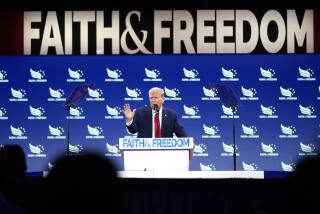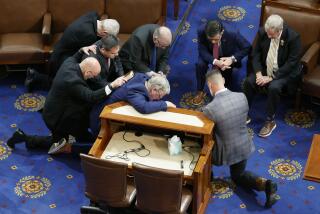Charity Begins at Church, Gov. Bush Says
- Share via
INDIANAPOLIS — In his first major policy address, Republican presidential front-runner George W. Bush on Thursday proposed an $8-billion program to significantly expand the role of faith-based charities and other community groups in delivering services to the needy.
Bush told an enthusiastic, interracial audience at a church here that he would offer tax incentives, changes in federal regulations and new grant programs meant to give neighborhood groups a central role in tackling problems from day care to drug addiction.
“In every instance where my administration sees a responsibility to help people,” Bush said, “we will look first to faith-based organizations, to charities and to community groups . . . .”
As intriguing as Bush’s specific proposals was the speech’s overall tone, which laid out his view of government’s role more clearly than he has so far. He called for “limited” government and repeated his promise to offer a tax cut plan later in the campaign.
But he also pointedly separated himself from President Reagan’s famous declaration that “government is the problem,” as well as the rallying cry of congressional GOP conservatives that Washington should simply “leave us alone.”
“The American government is not the enemy of the American people,” Bush insisted. “At times it is wasteful and grasping. But we must correct it, not disdain it.”
Bush maintained that one proper role for the federal government is to provide grass-roots institutions with resources to tackle problems themselves. By noting that government role, he went beyond a general praise of volunteerism, implicitly distancing himself from the “thousand points of light” theme that marked the presidency of his father.
In his speech, the Texas governor said: “It is not enough to call for volunteerism. Without more support and resources--both private and public--we are asking [religious charities] to make bricks without straw.”
In all, the speech made clear that Bush, much like Bill Clinton in 1992, hopes to change his party’s image with a message that blends its traditional goals with ideas usually associated with the other side of the political spectrum.
“This is the articulation of a new kind of conservative public philosophy,” said John J. DiIulio, a professor of religion and politics at the University of Pennsylvania who advised Bush on the speech.
But Bush’s effort to define an activist but limited role for government is likely to draw intense focus from rivals in both parties.
Already his conservative challengers--such as magazine publisher Steve Forbes and activist Gary Bauer--are accusing him of blurring the differences between the parties; Forbes responded to Bush’s speech by saying that the best way to increase charitable giving is to cut taxes across the board. He also chided Bush for failing “to reveal any . . . comprehensive tax reform plan.”
Conversely, Democrats increasingly are trying to challenge Bush’s claim to a “compassionate conservatism” by accusing him of resisting new government actions that could help the needy, such as raising the minimum wage and expanding access to health care.
Tony Coelho, chairman of Vice President Al Gore’s campaign, reflected that strategy Thursday when he criticized Bush not for the plan he unveiled but on issues such as shoring up Social Security and reforming health care organizations.
So little fire may have been directed at Bush’s proposals because the use of religious charities, or “faith-based organizations,” to deliver social services represents a rare area of increasing consensus between the parties. Advocates argue that these groups can be more effective than traditional government programs because they establish a more intimate connection with those in need.
As part of the welfare reform bill, Congress in 1996 provided states greater flexibility to contract with such religiously based groups to offer services for welfare recipients. In a speech this May, Gore proposed to expand the “charitable choice” law to let faith-based groups also receive government grants to combat drug abuse, homelessness and teen violence.
Bush’s speech went notably further in detailing an agenda to bolster these groups. With both his Republican rivals and President Clinton accusing him of only vaguely addressing the issues, Bush buttressed his speech with a 10-page list of specific proposals for the faith-based groups. In it, he called for action in three broad areas:
* Tax Incentives: To encourage more donations to charitable groups, he said all federal taxpayers--even those who do not itemize their deductions--should be able to deduct charitable contributions from their taxes. Bush proposed that states be allowed to use money from the welfare block grants provided by the government to fund new credits on state taxes for charitable donations. His staff estimated the cost of these--and smaller tax incentives he offered--at $6.3 billion annually.
* Grant Programs: Bush proposed to spend $1.7 billion annually in grants that would increase the role of faith-based organizations in several areas, ranging from mentoring programs for the children of prison inmates to group homes for unwed teens. In addition, Bush proposed a $200-million “compassion capital fund” to provide grants to expand or replicate innovative local programs.
* Regulation: Like Gore, Bush said federal law should continue to require that participation in any faith-based program be voluntary and that secular alternatives be provided. But he said he would reform government licensing and contracting rules so that these groups can “compete to provide services in every federal, state and local social program.”
More to Read
Get the L.A. Times Politics newsletter
Deeply reported insights into legislation, politics and policy from Sacramento, Washington and beyond. In your inbox twice per week.
You may occasionally receive promotional content from the Los Angeles Times.










